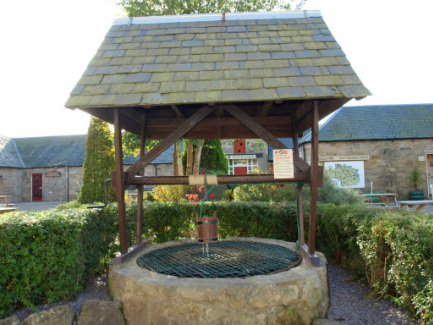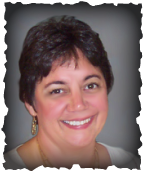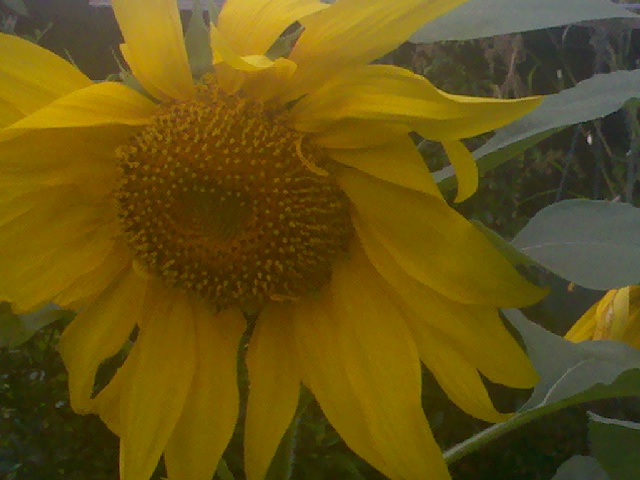|
8/31/2012 Letting the Well Fill UpThere's a lovely Southern expression, "Letting the well fill up", which means that you have to stop drawing water from the well in order to allow it time to replenish. I love this image! It surely applies to caregivers as a perfect metaphor for allowing ourselves the time to renew, reinvigorate, reach out for inspiration -- to have a respite from our cares and caregiving so that we can let our resources of love, energy, enthusiasm, and compassion be recharged from the inside out. To pause and "let the well fill up" with grace and guidance. Whatever your spiritual tradition, take the time you need to connect to your Source in prayer and meditation with heartfelt trust that the well will be filled to overflowing for you. And open your heart to receive the blessings!
Max Highstein has created a soothing, relaxing guided meditation called The Healing Well. To hear a sample of this and his other guided meditations with beautiful music, please visit www.guidedimagerydownloads.com 8/29/2012 Coping with EmergenciesAs if caregiving isn't complicated and stressful enough, life tends to throw emergencies into the mix, to challenge us even further. You know what I mean -- the random hurricane, flood or fire. These are tough to cope with in the best of times when you are strong, able-bodied and have your health. When you are caring for someone who does not meet these criteria, the emergencies of life can threaten to swamp you in both figurative and literal ways. There are some things that you can do to minimize the confusion and heightened stress that such an emergency brings. Here are a few ideas to help you cope:
1. Plan Ahead. This sounds simple, but takes thought, time and energy. It is vitally important to the outcome of a potential emergency situation. I suggest creating a portable, easily accessible Emergency Book. I used a large zippered three ring binder with pockets and a handle (available in office supply stores). This one book contains all vital information including insurance policies, health records, legal documents, current list of prescriptions & supplements for the care receiver, insurance cards, contact information for health care providers, friends & family. Because we live in a hurricane prone area, I also have a separate hurricane/disaster preparedness book, which is kept in the same location as the Emergency Book. The benefits of preparing these ahead of time are clear & dramatic when you need them in a hurry. You can grab it and go to any doctor's appointment, hospital emergency room, or mandatory evacuation shelter, for instance, and have everything you need all in one place. I included Medicare and insurance cards, copy of power of attorney and health surrogate papers, Living Will, etc., so there would be no question of authority. I also put together a "Hospital Overnight Bag", with all of the necessary items for care and comfort and kept this with the Emergency Book. You can vary the plan according to your specific needs, but the more comprehensive, the better. I kept the actual prescription bottles in the bag, since I used daily pill dispensers to give the medications. That way, if there were any questions, I had the original containers to rely upon. 2. Create a family plan of action. This is similar to number 1, but inclusive of your whole family. You already have contact information in the Emergency Book, but you need a plan of evacuation, what to do if you are separated, a pre-arranged meeting location away from your home, or other similar plan. There are online tools available for this purpose, and many social networking sites are now used to maintain contact and update others as to your status. However, if a storm were to cause widespread power and cell service outages, this would not be a viable means of communication. If your loved one requires care in a special needs shelter, for example, that must be arranged in advance. Also, remember to consider your pets in your planning. Just having the plan in writing, agreed upon by family members and neighbors (if you wish) and knowing what you would do in an emergency can bring tremendous peace of mind when an emergency arises. 3. Maintain a sense of normalcy as much as possible for as long as possible. It's very important for an already vulnerable adult (or child with special needs) to feel calmness and protection from their caregiver. One major mistake, easily made, is to leave the TV on with reports of storm projections and damage. That just ratchets up the tension and uncertainty and will eventually produce a sense of panic in those who are susceptible. It's better to quietly and calmly follow your plan in making preparations to evacuate (in the case of a storm or fire). Try to keep your own sense of equilibrium by using soft, calming music, aromatherapy, and deep breathing. They really do work, even, and perhaps especially in times of crisis. 8/14/2012 Being a Healing Presence"It may be when we no longer know what to do, we have come to our real work, and that when we no longer know which way to go, we have begun our real journey." ~Wendell Berry I have been pondering some deep subjects lately, spurred by both personal twists of fate and by a compassionate response to to the myriad circumstances and struggles of those around me. Some of my close friends are dealing with life and death issues, and many others, whom I know only at a distance, echo a host of seemingly desperate trials. All are searching (at least it seems to me), even as they deal with the daily onslaught of emotions, decisions, caring for others, trying to live their lives with grace and truth and to find a modicum of peace. Finding our balance in a world where the ground is shifting with seismic forces (emotionally and quite literally) beyond our control is a daunting prospect, yet the changes coming at us are constant, unavoidable and accelerating. I think this condition is common to most caregivers, as well, since there is almost always uncertainty and emotional upheaval involved at some point in the caregiving story. It is very easy, indeed, to slide into despair, or to anesthetize ourselves with various escapist paths, such as drugs or alcohol. Or, our response may be to stick our heads firmly in the sands of denial. Or to lose ourselves in an absolutely exhausting, endless "doing". It is less easy to stay present to our lives and ask the hard questions: why are we here, with these people, in this time and place? What is our purpose? OK, I know I'm getting a bit mystical and metaphysical here, so hold onto your hat! What if the reason we are living here and now is a very high purpose, indeed -- a calling to heal ourselves and our planet? Could it be that the sum of life experiences we have individually lived, loved, worried about, prayed for, meditated on have been simply preparation for this incredibly important work? What higher calling could there possibly be? I think this call to healing is one felt by most caregivers, whether acknowledged or not, and whether they are professional or family carers. It's a deeply intrinsic, instinctive part of our human psyche to want to heal situations, people, and certainly those we love. So perhaps Wendell Berry is right in saying that when we no longer know what to do, we have come to our real work. Maybe it's time to stop struggling and start healing. It only requires a shift in your perspective to cross the chasm. It's not as wide as you might think! Or, when you reach the end of your metaphorical rope, you can choose to just tie a knot in it and hang on...it is your choice. We each choose our coping mechanisms. I just read a lovely book titled, The Gift of Healing Presence: Encouraging Thoughts for Busy Caregivers, by James E. Miller. In the introduction to the book, Miller writes: "I've created this writing with busy caregivers in mind, all sorts of them -- professionals, family members, friends, volunteers. I hope the following pages of thoughts, quotations, and images will invite you into this subject in a gentle, calming, and affirming way. After all, that's what healing presence is all about." This is quite a special book, as I realized after reading the first few pages. It offers a caregiver a chance to understand what it means exercise the power of healing presence and to make a difference in very real and deeply moving ways. Miller writes: "Healing presence is a deeply conscious and compassionate sharing of moments with another person that naturally encourages a movement toward greater wholeness." This is a beautiful definition, because the greater wholeness is tangible and mutual -- both the person expressing healing presence, and the one they are with experience a lifing up, a healing. Being attended (on all levels) by a compassionate listener who cares about us is a powerfully transforming gift. We are so very focused on doing in our current world. One is considered lazy, and beneath contempt if he or she is not constantly striving for more -- be that possessions or power or other earthly goal. Yet, in the end, if we do manage to capture "more" it is a fleeting success we enjoy, empty and lacking. Our response? To try harder still, seek more diligently, actively, ruthlessly, and often, selfishly for that brass ring -- you know, the one thing, that if you have it, you'll be complete. I submit that is a total myth, and we have all been dreaming that same collective dream. It's now time to awaken, not to act, but learn first to "be" -- to be present, to be in the consciousness of healing. This is a major life shift, I'm speaking of and some will find it incomprehensible and maybe even a bit frightening. For others, my hope is that as you read these words, there's a little zing of truth in your being. Pursue that. It is worthy. I wish you happiness and fulfillment as you discover your "real work" and begin on your "real" life's journey! 8/2/2012 The Gift of Now"There exists only the present instant, a Now which always and without end is itself new. There is no yesterday nor any tomorrow, but only Now, as it was a thousand years ago and as it will be a thousand years hence."
~Meister Eckhart As caregivers, we are called on to become a sort of human interface between the recipient of our care and the larger world. We do this in so many ways, some intuitive and relatively easy, others incredibly difficult. We are often the keeper of finances, of medical records, dispenser of medications, the nurse, the liaison with doctors, the housekeeper, the personal shopper, the chef, the confidante. We, in essence become the eyes, ears, hands & heart of our loved one -- protecting them from harm in every way possible and taking up their cause when they are not able. In a sense, that is what makes it so wrenching when our loved one cannot be "cured", as is the case in Alzheimer's Disease. Often, I think we feel a sense of failure as caregivers (daughters, sons, spouses) that we aren't able to somehow miraculously save them from the fate of the illness. But, even in the midst of such feelings of helplessness, we can find the greatest of gifts: the power of living in the present moment. If you could boil down all of life's peaks and valleys and distill its very core into one simple sentiment, it is finding value and joy in the present moment. This was the precious gift I received daily from my mother. In her world, there was nothing but the present moment -- and she never lost her childlike joy in discovering and savoring it. Whether she was opening a greeting card and admiring it (for the first or the fiftieth time), petting her cat, eating a bowl of ice cream or watching a sunset, she experienced true delight in that moment. And I did, also, in witnessing the beauty of her response. If I spread a nice-smelling lavender lotion on her skin, her palpable enjoyment was uplifting because it was so simple and honest. She became alive to her senses with a focus on "now" that was amazing. What if we could all live our lives in this direct, worry-free way? How would it change us? Change the world? If you are in the midst of your caregiving role, I urge you to take a step back from the "have-to- dos", the "shoulds", the anxiety over possible future problems (which most times never actually happen), and be totally in the moment with your loved one -- feeling the rich reward of a heart full of love, sharing a simple pleasure and making this moment good. Cherish the gift. It is a life-transforming and life-affirming one! |
About Karen
Karen is a compassionate, enthusiastic student of life, who cared for her mother for 17 years. She brings her insights, compassion, experience and desire to share knowledge and healing to this ongoing conversation with others on the caregiving path. If you are caring for a parent, spouse, friend or other loved one this site offers sanity-saving tips, open-hearted self-care ideas, and an open forum for discussion, connection and sharing resources for the journey. Archives
October 2021
CategoriesAll Acceptance Aging Together Alan Cohen Alive Inside Movie Alzheimer's Alzheimer's Prevention A Mind Of Your Own Anxiety Aromatherapy Audio Therapy For PTSD Austin Air Hepa Filter Autism Back Care Video Beginner's Mind Being Present Blessing For Caregivers Books Brain Insulin Butterfly Story Calm Calm.com App Care For Veterans Caregiver Advocate Caregiver Coalition Caregiver Comfort Kit Caregiver Guilt Caregiver Retreat Caregiver's Serenity Prayer Caregiver Stress Caregiver Support Care Giving Caregiving Vulnerability Care In Hospital Caterpillar Into Butterflies Chamomile Tea Cindy Laverty Comedian Computers & Exercise Crisis Dan Cohen Deepak Chopra Delirium Depression Diabetes Disaster Preparedness Distractions Dr. Dharma Singh Khalsa Dr. Oliver Sacks Eden Alternative Eldershire Elizabeth Dole Foundation Emergency Planning Emergency Preparation Emerson End Of Caregiving Enough Already Escapism Essential Oils Food Safety Forgiveness Funny Stories Gaiam.com Gail Sheehy Gift Of Alzheimer Gift Of Healing Presence GMO Food Green House Project Gregory Fricchione Md Grief Guilt Happy Light Healing Holding Hands Home As Sanctuary Hope Hospital Caregiving Hospital Stay Humor Inspirational Reading Ipods For Nursing Homes Isolation Jacksonville James E. Miller John Denver Johns Hopkins Study John T. McFadden Jon Kabat-Zinn Kelly Brogan Kirtan Kriya Meditation Lao Tzu Laugh Laughter Lavender Loneliness Loss Of Purpose Love Love In The Nursing Home Maya Angelou Mayo Clinic Mayo Clinic Alzheimer's Blog MD Meditation Meditation Garden Melatonin Memory Memory Cafe Military Caregiver Mindfulness Meditation Mr. Bean Music Music & Alzheimer Music And Memory Neurological Research Noise Pollution Operation Family Caregiver Opportunity Overnight Respite Care Pandemic Passages In Caregiving Patience Paul Coelho Peace Post-traumatic Stress Disorder Power Of Love Prayer PTSD Quality Of Sleep Radical Contentment Relaxation Releasing Problems Renewal Research Respite Rewind Rodney Yee Rosalynn Carter Rosalynn Carter Institute For Caregiving Rowan Atkinson Sanctuary Sanity Self Care Serenity Silence Sleep Slowing Time Solutions Soothing Music Stress Stress Relief Sun Sunshine Support For Caregivers Tai Chi Thanksgiving The Care Company The Kiss Time Traumatic Brain Injury Travel With Alzheimer's Person Treat VA Caregivers Valentine's Day Verilux Veteran Farms Veterans Veteran Suicide Vitamin D Wayne W. Dyer Wellness Wendell Berry White Noise William H. Thomas Worry Yoga Yoga Video |
Caregiver Wellness
Popular pages on this site:
|
Self-Care Practices
Explore what works for you:
|
Original content © 2012-2023 Karen Bonnell all rights reserved


